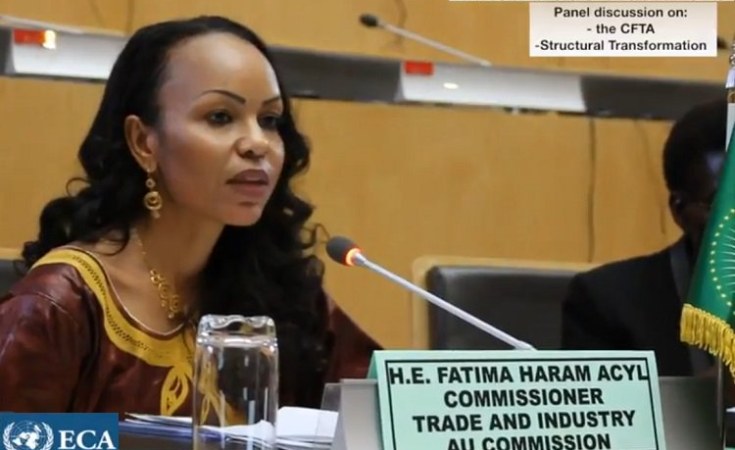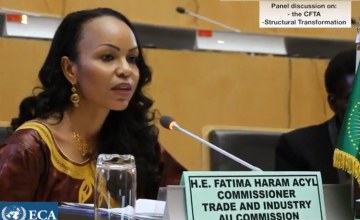Excellencies
Distinguished delegates
Ladies and gentlemen
Dr. Abdalla Hamdok, who recently took over as ECA's Acting Executive Secretary, cannot be with us this week due to pressing and unavoidable commitments. He has asked me – in my role as Coordinator of the African Trade Policy Centre – to make the following statement on his behalf.
Welcome to the first ever Africa Trade Week. ECA is delighted to partner the African Union Commission and others in organizing Africa Trade Week which brings together stakeholders, from Government, civil society, the private sector and academia to have a big conversation on Africa's trading relations within the continent and with the rest of the world. By opening the issues for discussion, we hope to ensure that Africa's approach to trade is inclusive and respects the rights and views of all groups represented.
Recent developments around the world including Brexit and the US elections have made clear a trend towards greater inclusivity and voice to stakeholders in the design of trade policy. A number of events have been organized this week to ensure input and voice. Specifically in regard to the Africa Trade Forum, there will be scope to discuss the full range of key African trade policy issues. These include Africa's trading relations with Asia, Europe, the United States and emerging markets; how trade can support gender equality and empowerment; perspectives from the regional economic communities (the RECs); and of course the Continental Free Trade Area (CFTA) negotiations and related flanking measures.
Let me start by talking about the CFTA. The CFTA presents us with a critical opportunity for African development. Our research shows that a CFTA in goods alone, if complemented by action on trade facilitation would be expected to boost Africa's GDP by 1 per cent, with every African country and region experiencing income gains. Recent work by the South Africa-based Trade Law Centre (TRALAC) suggests that a similar level of increase could be achieved through trade in services liberalization, with most African countries seeing their income rise by over 1 per cent and all African countries and regions studied benefiting, in response to a 50% reduction in services trade restrictiveness. Given that the CFTA negotiations will also cover investment, and if we assume the same level of increase relative to the share of investment in Africa's economy, this would add another 0.5 per cent to Africa's economic output. Adding this up, we calculated at ECA that this means that the CFTA could add up to 2.5 % to Africa's annual economic output, which is around $65 billion based on data for 2014. Perhaps more importantly, and unlike much of the commodity driven growth that we have recently experienced, the CFTA is also likely to make growth in the African economy more sustainable and inclusive. This is because many of these gains are forecast to be in the industrial sector which, as ECA has shown in the Economic Report on Africa series, is the key to sustained, inclusive and job-rich development. As a result, the CFTA can be expected to give a serious boost to Africa's industrial sector, with intra-African trade in industrial products expected to rise by $60 billion annually due to a CFTA in goods if accompanied by robust trade facilitation measures.
As such, the CFTA presents us with an opportunity that we simply have to seize. But how do we do so? There are still many questions that remain to be answered on how exactly to pursue this most important initiative. How should we involve civil society and the African citizenry 4 so that the CFTA has legitimacy among the people of Africa? What level of liberalization should the continent aim for at the beginning, given the adjustment costs? What safeguards are needed to protect the most vulnerable and those who may be driven out of business by the CFTA? For individual countries, which sectors should they liberalize, and how do they identify sectors that they do not want to include in tariff offers or services or investment liberalization commitments? How do we get the details right such as rules of origin, technical barriers to trade, sanitary and phytosanitary measures, dispute settlement and arrangements to ensure effective monitoring of the impact of the agreement? How can we ensure that the CFTA gets effectively implemented?
The last point is particularly important, given that, despite our repeated aim for an integrated Africa, we have not made sufficient progress in opening African economies to one another. The CFTA aims to change this, but in order to do so, it must follow a different approach to previous initiatives that have not been fully implemented. This week, in our big conversation, we should all seize the opportunity to discuss how to turn the CFTA into a reality. The other issues that we will cover over the course of this week will also be very important for the continent. Relations with Asia, Europe and the United States account for massive shares of our trade currently, and it is important for us to get these right – the sessions on these topics will allow us to examine our trading relationships with these partners and how to recalibrate them to ensure coherence with the CFTA initiative and its objectives.
Trade also has the potential to help to address economic inequalities between the two genders, and we need to make sure that Africa's trade policy delivers on this point. I am pleased that 5 the African Trade Forum includes an opportunity to discuss trade and gender issues and the importance of trade policy being gender sensitive.
Finally, ECA and other research shows the critical importance of trade facilitation, not only in supporting the continent's development directly, but also in making sure that all African countries gain from trade agreements including the CFTA. As such, the African Trade Facilitation Forum which is part of Africa Trade Week and begins on Thursday will provide us with an opportunity to act on these findings and to get a clearer idea about how trade facilitation can best be deepened on the ground in Africa.
On this note, I do not want to take too much time away from these critical conversations and discussions, and so without further ado I wish you all successful deliberations. Thank you for listening.



